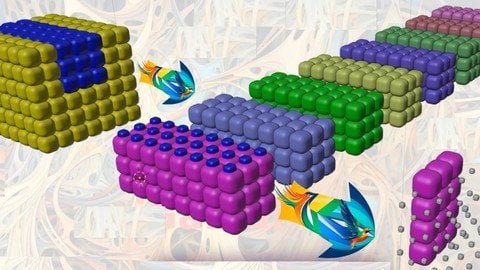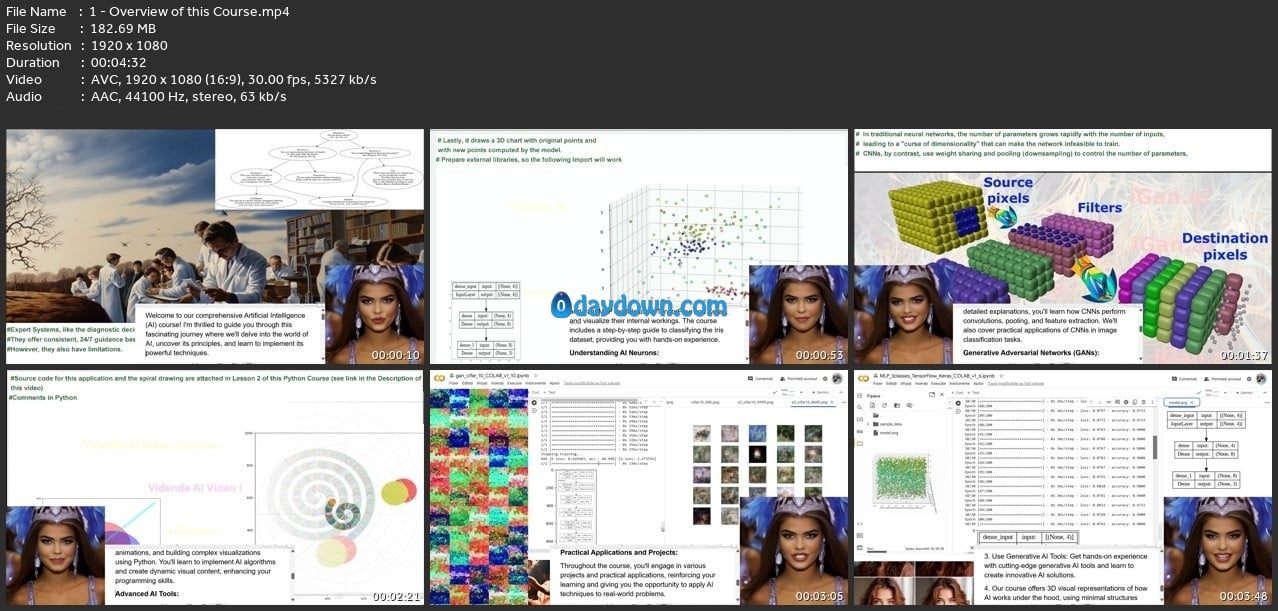
Published 8/2024
MP4 | Video: h264, 1920×1080 | Audio: AAC, 44.1 KHz
Language: English | Size: 3.67 GB | Duration: 2h 33m
Generative Adversarial Networks, Convolutional Neural Networks, Image Creation, Labeling, and Multi-Layer Perceptrons
What you’ll learn
Understand the Historical and Modern Importance of Algorithms, Understanding of AI Concepts through Analogies, Gain Insight into the Evolution of AI
Mastering Multilayer Perceptrons (MLP): Implement a 3-class classification using TensorFlow and Keras, MLP architecture, and practical applications in ML
Visualizing AI Neurons, activation functions, implement micrograd backpropagation in deep convolutional networks, analyze neural network at granular level
Convolutional Neural Networks (CNNs), image classification and deep learning. Visualize CNN operations and implement CNN models using Python and TensorFlow
Generative Adversarial Networks (GANs): Principles of GANs and their applications. Develop and evaluate GAN models, using datasets to generate new images.
Comprehensive understanding and practical skills in key areas of artificial intelligence and machine learning, preparing advanced projects and research
Requirements
Code Examples in Python: All code examples and exercises in the course will be in Python. Prior experience with Python will be advantageous but not strictly necessary, as the course will provide necessary resources and support.
Description
Hello students,Welcome to our comprehensive Artificial Intelligence (AI) course! I’m thrilled to guide you through this fascinating journey where we’ll delve into the world of AI, uncover its principles, and learn to implement its powerful techniques.Course Overview – Introduction to AI:We kick off the course with an introduction to AI, explaining its fundamental concepts and the distinction between symbolic AI and machine learning. You’ll learn about the different types of AI, including narrow and general AI, and how AI is transforming industries today.Mastering Neural Networks:We’ll dive deep into neural networks, starting with Multi-Layer Perceptrons (MLP). You’ll learn to build and train MLP models using TensorFlow and Keras, and visualize their internal workings. The course includes a step-by-step guide to classifying the Iris dataset, providing you with hands-on experience.Understanding AI Neurons:In this lesson, we explore the functioning of AI neurons, focusing on inputs, weights, and activation functions. You’ll gain a clear understanding of how neurons process information and contribute to the overall performance of neural networks.Convolutional Neural Networks (CNNs):CNNs are a cornerstone of AI, especially in image processing. Through engaging 3D animations and detailed explanations, you’ll learn how CNNs perform convolutions, pooling, and feature extraction. We’ll also cover practical applications of CNNs in image classification tasks.Generative Adversarial Networks (GANs):We delve into GANs, an exciting area of AI that focuses on generating new data. You’ll learn how GANs work, their components (generator and discriminator), and how they train through adversarial processes. This module includes hands-on coding exercises to generate images similar to those in the CIFAR-10 dataset.Python Programming for AI:Python is an essential tool for any AI practitioner. Our course includes tutorials on drawing shapes, creating animations, and building complex visualizations using Python. You’ll learn to implement AI algorithms and create dynamic visual content, enhancing your programming skills.Advanced AI Tools:Explore state-of-the-art tools like ChatGPT and Midjourney. You’ll learn to create innovative AI solutions, from writing text to generating images, using these powerful generative AI tools.Building AI Hardware:For those interested in the hardware side, we have a module dedicated to assembling an AI server with multiple GPUs. You’ll get step-by-step instructions on setting up your own high-performance AI hardware, ideal for intensive computational tasks.Practical Applications and Projects:Throughout the course, you’ll engage in various projects and practical applications, reinforcing your learning and giving you the opportunity to apply AI techniques to real-world problems.Course ObjectivesBy the end of this course, you will:1. Understand AI Principles: Gain a solid understanding of AI, its various models, and real-world applications.2. Develop Python Skills: Acquire or enhance your Python programming skills, crucial for implementing AI algorithms.3. Use Generative AI Tools: Get hands-on experience with cutting-edge generative AI tools and learn to create innovative AI solutions.4. Our course offers 3D visual representations of how AI works under the hood, using minimal structures that mirror AI functionalities and results. This method is tailored for enthusiasts of animation and geometry, making intricate AI concepts both accessible and engaging.Getting StartedLet’s embark on this exciting journey together! Prepare to be amazed by the capabilities of AI and inspired by the endless possibilities it offers. Dive into the first lesson and start exploring the transformative world of Artificial Intelligence.Happy learning!
Overview
Section 1: Introduction
Lecture 1 Overview of this Course
Lecture 2 Introduction
Lecture 3 About Your Instructor
Lecture 4 Resources Preview
Section 2: Mastering the Multilayer Perceptron (MLP): 3-Class Classification TensorFlow
Lecture 5 Mastering the Multilayer Perceptron (MLP) – Introduction
Lecture 6 A Deep Dive into 3-Class Classification with TensorFlow and Keras
Lecture 7 Understanding AI Neurons: Visualization, Activation Functions, and Micrograd
Section 3: Convolutional Neural Networks (CNN), Artificial Intelligence, Machine Deep Learn
Lecture 8 Convolutional Neural Networks (CNN), Machine Deep Learning
Lecture 9 CNN Image Classification, Labels, Deep Learning, ImageNet
Lecture 10 Visualizing CNN Convolution in Action: Animation Demonstrating Computation
Section 4: Applications of AI
Lecture 11 Midjourney-Zoom Out Feature – Generated Movie
Lecture 12 Movavi Video Editor – Join Midjourney images into a Zoom Out Movie
Lecture 13 MidJourney Discord Zoom Out Zoom In, GAN AI, Generative Adversarial Networks
Lecture 14 Generative Adversarial Networks (GAN), Cifar, source code
Lecture 15 ChatGPT Interpreter
Section 5: Python Programming Language for AI
Lecture 16 Python – Draw Simple objects
Lecture 17 Python – Creating Animations
Section 6: Build an Artificial Intelligence Server
Lecture 18 Assemble the Hardware Components of an AI Server
Section 7: Resources
Lecture 19 Resources Set 1
Intended Learners This course is designed for a wide range of individuals who are eager to delve into the world of artificial intelligence and machine learning. The course content will be valuable for:,1. Beginners in AI and Machine Learning: Individuals with no prior experience in AI or machine learning who want to understand the fundamentals and start building practical skills in these fields. The course is structured to provide a comprehensive introduction, making it accessible to those new to the subject.,2. Programming Enthusiasts: People with a basic understanding of programming, especially in Python, who are looking to expand their knowledge and apply their skills to AI and machine learning projects. This includes hobbyists, self-taught programmers, and coding bootcamp graduates.,3. Students and Academics: University and college students studying computer science, data science, or related fields who wish to supplement their academic knowledge with practical, hands-on experience in AI and machine learning. This course can serve as a valuable resource for coursework and research projects.,4. Professionals Looking to Upskill: Working professionals in the tech industry, such as software developers, data analysts, and IT specialists, who want to transition into AI and machine learning roles or enhance their existing skill sets. The course offers practical applications and projects that can be directly applied to their work.,5. Entrepreneurs and Innovators: Individuals interested in leveraging AI and machine learning to create innovative solutions, develop new products, or improve existing business processes. This course provides the foundational knowledge needed to understand and implement AI technologies.,6. Curious Learners: Anyone with a curiosity about how AI and machine learning work, how these technologies are shaping the future, and how they can be applied in various domains, from healthcare to finance to entertainment.,By catering to this diverse group of learners, the course aims to democratize access to AI and machine learning education, empowering individuals from all backgrounds to participate in the AI-driven future.
转载请注明:0daytown » Artificial Intelligence Essentials – Gan, Cnn, Mlp, Python
 Password/解压密码www.tbtos.com
Password/解压密码www.tbtos.com